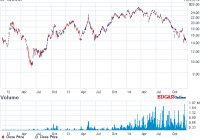Grexit Fears And Fed Meeting Put These ETFs In Focus
This week started with a rough stock market session as major benchmarks finished the day in the red. The Dow Jones Industrial Average fell more than 200 points in early Monday trading and was down 0.6% at the close. In fact, the steep decline eroded all the gains made this year and sent the Dow Jones into red from the year-to-date look as well. The downswing has mainly been blamed on growing concerns over the future of Greece in the Euro zone. Tensions on Rise The latest talk between Greece and its international creditors collapsed yet again last weekend, sparking off threats of default and a possible Greek exit from the Euro zone. The move sent panic alarms ringing all over the globe and renewed uncertainty in the global stock market. Notably, the Greek bourse fell 4.9% on Monday trading session, spreading the contagion across the European, Asian and U.S. markets. Added to the Greece concern is the Federal Reserve’s two-day meeting, which ends on Wednesday. Investors have been cautious and are keeping a close eye at this meeting to find out whether the Fed Chair Janet Yellen modifies the language regarding the rates hike or adds some color to the decision. While the Fed will not raise interest rates at this meeting, a spate of better-than-expected economic data has raised speculation for a hike in September or October. The Fed is expected to release its policy statement, economic outlook and interest rate forecasts at the end of the ongoing meeting. Market Impact The events have led to risk-off trading with lower risk securities, including precious metals and bonds, in vogue. Meanwhile, the broad U.S. market fund (NYSEARCA: SPY ) saw volume that exceeded 124 million shares on the day, well above average shares of roughly 105 million. A few ETFs were severely impacted by the news of the Greece deal failure while a few were in focus ahead of the Fed meeting. Below are four ETFs which are especially volatile in the wake of the Greece crisis and amid uncertainty regarding the timing of the interest rates hike: Global X FTSE Greece 20 ETF (NYSEARCA: GREK ) The Greece ETF was the worst performer on the day, losing 6.5% on elevated volume of 1.5 million shares compared to 815,000 shares on average. The fund tracks the FTSE/ATHEX Custom Capped Index and is home to a small basket of 21 companies. It is heavily concentrated on the top firm – Coca Cola HBC – at nearly 21% while other firms make up for less than 10% share. Financials takes the top spot at 25% in terms of sector holdings, followed by consumer staples (21%), consumer discretionary (16%) and telecom (10%). The product has AUM of $330 million and charges 61 bps in fees per year from investors. iPath S&P 500 VIX Short-Term Futures ETN (NYSEARCA: VXX ) While volatility products have been terrible performers over the medium and long terms due to a contangoed market and a steep roll cost, they are intriguing picks during periods of turmoil or uncertainty. That being said, VXX gained 4.2% in the session while volume hit 56.4 million shares, well above the 39.1 million average. The note has amassed $1.1 billion in AUM and charges 89 bps in fees per year. The ETN focuses on the S&P 500 VIX Short-Term Futures Index, which reflects implied volatility in the S&P 500 Index at various points along the volatility forward curve. It provides investors with exposure to a daily rolling long position in the first and second months VIX futures contracts. SPDR Gold Trust ETF (NYSEARCA: GLD ) Gold is often viewed as a store of value and a hedge against market turmoil. The product tracking this bullion like GLD could be an interesting pick to play the market turbulence. The fund tracks the price of gold bullion measured in U.S. dollars, and kept in London under the custody of HSBC Bank USA. It is the ultra-popular gold ETF with AUM of $26.7 billion and expense ratio of 0.40%. However, the ETF added just 0.4%, exchanging more than 500,000 shares in hand. The upside was capped in anticipation of a hawkish stance in the Fed meeting that would further boost the dollar against the basket of major currencies and dampen the safe haven appeal across the board. iShares 20+ Year Treasury Bond ETF (NYSEARCA: TLT ) The U.S. government bonds tracking the long end of the yield curve often carry a safe haven status. The flight-to-safety on Greece default concerns led these bonds higher in early trading but soon eroded most of the gains on rising rates concern. As such, the ultra-popular long-term Treasury ETF – TLT – was up only 0.2% on the day on below average daily volume. It tracks the Barclays Capital U.S. 20+ Year Treasury Bond Index and has AUM of over $4.3 billion. Expense ratio came in at 0.15%. Holding 30 securities in its basket, the fund focuses on the top credit rating bonds with average maturity of 26.90 years and effective duration of 17.20 years. Original post
